Latest Posts

The English Concept of Domicile and How to Challenge It
This article examines the English concept of domicile, explaining why it is important and should not be confused with residency, nationality or immigration status. It also considers the evidence the English Court will examine when a person’s domicile is challenged.
The English concept of domicile is based on English common law, i.e. historic case law, and it is different to what might be understood by the term ‘domicile’ in other jurisdictions, in particular civil jurisdictions where the term domicile for the most part is interchangeable with residency. It is also not uncommon for people, especially internationally mobile HNW individuals and executives, to have a domicile which is different to their residency and/or nationality. The English meaning of domicile can be partly understood as meaning someone’s “permanent home”.
The Law
There are three types of domicile: a domicile of origin, a domicile of choice and a domicile of dependency.
1. Domicile of Origin
In English common law, every person is born with a domicile of origin, which is then their domicile until it is displaced notwithstanding that it is possessed involuntarily. The domicile of origin of a legitimate child born during the lifetime of his father is his father’s domicile at the time of birth.
For the avoidance of doubt a domicile of origin cannot be chosen and can only be lost if a new domicile of choice (see paragraph 2 below) is acquired. A person’s domicile of origin remains their default domicile for their entire life but can in certain circumstances revive if a person’s domicile of choice is abandoned (see paragraph 3 below).
2. Acquisition of Domicile of Choice
Once 16 years old, a person may displace their domicile of origin by acquiring a domicile of choice. A person acquires a domicile of choice in another jurisdiction by residing there with an intention to do so permanently or for an unlimited time. Therefore, there are two distinct parts to acquiring a domicile of choice, namely:
- the individual must physically reside in their country of choice (rather than be a mere traveller or occasional visitor); and
- have an intention to reside in that jurisdiction permanently and indefinitely, which intention is not limited for a particular period or particular purpose.
It is the second limb of this test which can mean a domicile of choice is hard to obtain despite many years or even decades of residency in a foreign jurisdiction. Direct evidence that the individual in question intended to reside permanently in his chosen jurisdiction of residence is required before s/he can definitively be said to have lost his or her domicile of origin and acquired a new domicile of choice. This notwithstanding:
- If a person determines to spend the rest of his life in a jurisdiction, then he has the necessary intention, even if he does not consider that decision to be irrevocable. The absence of any intention to leave may suffice.
- It will not be sufficient if there is an intention to return to the jurisdiction of previous domicile at some point, so that although present residence is indefinite, it is not unlimited in time, unless that intention is so vague as not to be properly formed.
3. Loss of Domicile of Choice
If a domicile of choice is never acquired, or is acquired but then abandoned, the domicile of origin will prevail (i.e. revive).
A domicile of choice is abandoned by giving up both the residence and the intention necessary for its acquisition in the first place.
4. Domicile of Dependency
This concept is less relevant today but is still worth bearing in mind:
- Legitimate children up to the age of 16 are dependent on their father’s domicile, as set out above. Where a child is born out of wedlock or their father is deceased, they may take on their mother’s domicile.
- Women who were married before the Matrimonial Causes Act 1973 came into effect in 1973 took on their husband’s domicile.
Why is Domicile Important?
The English concept of domicile matters because it determines which legal system has the strongest claim over a person’s life for core issues such as taxation, succession, and jurisdiction. It is far more enduring than residence and often decisive in private wealth disputes.
Tax
Domicile is central to determining an individual’s exposure to UK taxation, particularly inheritance tax. It dictates whether a person is taxed on their worldwide estate or only on UK-situated assets, and it governs access to favourable regimes historically available to non-UK domiciled individuals. Because domicile is difficult to change and heavily intention-based, it often becomes a decisive issue in tax planning and disputes involving internationally mobile clients.
Succession
In cross-border estates, domicile determines which country’s succession laws apply on death. This can affect the validity of wills, the distribution of assets, and the interaction with forced-heirship regimes overseas. In contentious private wealth matters, establishing a deceased’s true domicile frequently shapes the entire litigation strategy, as it may determine both the applicable law and the rights of competing beneficiaries. For example, to bring a claim under the Inheritance (Provision for Family and Dependants) Act 1975, the deceased must have died domiciled in England and Wales.
Family Law
Domicile also plays a significant role in family law, influencing jurisdiction for divorce, financial relief, and the recognition of foreign marriages or divorces. Because domicile is treated as a person’s “personal law,” it can affect questions of capacity and personal status. Its enduring nature means that domicile often anchors jurisdiction even when individuals have lived in multiple countries.
How to Challenge Domicile
Where domicile is in dispute, it must be determined by the English Court, which will normally order a hearing so that it can review all the facts and come to a decision. The burden of proof for proving that an individual has acquired domicile of choice is that of the person or entity alleging it.
Domicile disputes are very fact sensitive and judges have a wide amount of discretion to decide them. Therefore, trials regarding domicile can be unpredictable and each case will turn on its own specific facts.
However, the court will tend to examine the following categories of evidence before making an overall assessment on the balance of probabilities:
Family Background: the court will want to review a person’s family background in detail including the birthplace of parents and grandparents. It will also examine marriages, divorces and conduct a careful review of where the person in question lived as a child and with whom. The court will also examine a person’s current family including the birthplace and nationality of any spouse and children. Family ties are also important and the court will look to understand where close family members reside and where a person’s children are educated, as this can indicate where a person’s ‘domicile’ or ‘permanent home’ might be.
Physical Presence: the court will want a full history of where the person in question has lived and why, i.e. for school, work etc. Dates of residence in a particular country and intention regarding residence there will be examined. The court will also examine residency, where a person pays taxes and what citizenship they hold. It will also require information on visits to a person’s country of birth and will want to examine a person’s relationship with their country of origin.
Property and Assets: the court will want to know where a person owns property and hold assets. This includes the location of any family home, pensions, bank accounts, investments etc. The analysis can be quite granular and the court may go as far as to examine which bank accounts etc. are or have been used most frequently to understand where a person has been resident or visits most frequently.
Social Ties: the court will even go as far as examining a person’s social ties, including if they belong to any clubs, what football team they support and where their registered doctor and dentist are located. They will also look to understand where a person has voted and what causes or interests he or she support.
Therefore, for highly mobile individuals, a domicile challenge is likely to involve a significant examination of their personal life. Small and seemingly insignificant details can make all the difference and should not be underestimated.
The Private Wealth Disputes team at Quastels LLP are adept at advising clients on all aspects of domicile, including when to issue or defend a domicile challenge.
Read More
A Welcome Relief
Ever since they were announced at Autumn Budget 2024, the Government’s reforms to Agricultural Business Relief (APR) and Business Property Relief (BPR) have been a source of great concern to many owners of farms and family businesses. This has been particularly the case for farmers, who worry that an Inheritance Tax (IHT) bill may be unaffordable given the combination of small farming incomes and high land values, and therefore that succession to the next generation may become unviable.
However, in a rare bit of good tax news, the Government announced a pair of changes late last year that will both save tax and somewhat simplify planning.
The changes
For a full explanation of the reforms as originally proposed, see our previous article. In brief, they mean that from 6 April 2026 a cap will be introduced on the total value of property on which APR and BPR can be claimed at the rate of 100%. Anything above that threshold will be limited to 50% relief.
The first change to the proposed reform came at the 2025 Budget, when it was announced that the threshold would become transferable between a married couple or civil partners. In other words, if the person who died first did not fully utilise their own 100% allowance (for example, because they left the assets qualifying for relief to their spouse/civil partner), the person who died second would then be able to claim a double allowance.
Significantly, the Government confirmed that this would apply even where the first person had died before the reforms were announced. This will therefore avoid one of the significant points of unfairness that had been identified with the original proposals, in which a person who had been widowed before Autumn Budget 2024 would have missed out on the opportunity to take advantage of their deceased spouse/civil partner’s allowance.
The second change was slipped out in a press release on 23 December 2025, although no doubt will have come as a welcome Christmas present for many families. This increased the allowance for 100% relief from £1 million to £2.5 million.
What it means for you
These changes will clearly be good news for owners of family businesses and agricultural land. Two key benefits are:
- the transferability of the allowance means that it will no longer be as necessary to structure estate planning in such a way as to utilise the allowance on the first death (for example, by giving a share of the land/business to children or a trust); and
- the increased thresholds can reduce IHT bills for anyone with a farm or business worth more than £1 million, and for some may mean they no longer have an IHT bill at all.
However, despite these changes, careful planning and expert advice will still be very important.
For one thing, many families will still find themselves with a sizeable IHT bill even with the increased threshold. They may benefit greatly from proper estate planning advice. The best strategy will of course depend on their particular circumstance, but could for example include lifetime gifts of land, company shares or partnership capital, or redirecting assets into a trust (which will still benefit from their own separate £1 million allowance for 100% relief).
Moreover, it is important to remember that the conditions for claiming APR and BPR have always been very strict and full of traps for the unwary. Very small details may result in a loss of relief (and therefore a vastly-higher tax bill) if not spotted in time.
If you are planning to rely on APR or BPR as part of your own succession plan, please do contact the Private Wealth and Tax team at Quastels, who have a great deal of specific experience in this area. We can review your current arrangements and identify the risks and opportunities you need to consider.
Read More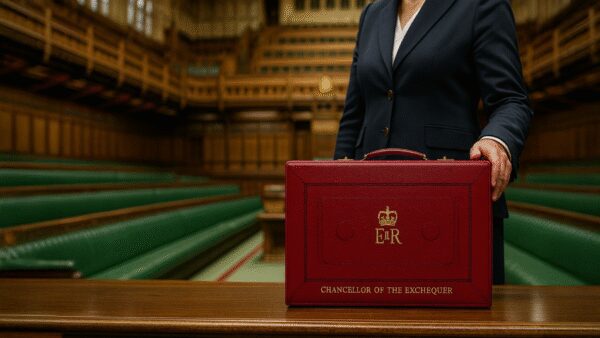
Budget 2025 Briefing Note
Budget 2025 has perhaps felt like the longest-running fiscal event in UK history, with months of leaked policy (and leaked policy reversals) giving rise to endless speculation within the media and professional circles. This was all capped off by the Office of Budget Responsibility accidentally publishing its report on the Budget shortly before Rachel Reeves gave her speech to Parliament, eliminating what little surprise remained.
In the end, we were left with a Budget without many of the big changes that had previously been leaked. The main rates of income tax and capital gains tax remained untouched, although there will be additional higher rates of tax applying to dividends, property income and interest. We will see a brand new tax in the form of the ‘High Value Council Tax Surcharge’ (also known as the ‘Mansion Tax’) applying to residential properties worth more than £2 million, although the level of the charge is perhaps a lot lower than many will have feared. The one largest revenue-raising measure of the Budget was simply the decision to freeze income tax thresholds at the current levels.
The devil is as always in the detail. Some of the less-obvious changes will come as an unpleasant surprise, such as the reduction of the Capital Gains Tax holdover on a transfer of a business to an Employee Ownership Trust. Others will be a great relief, such as permitting the transfer of the £1 million allowance of 100% Business Property Relief and Agricultural Property Relief between spouses.
The Private Wealth and Tax team at Quastels has been combing through the detail of today’s announcements in order to highlight what we consider to be the most significant changes for private clients. As always, if you would like further detail about any of these changes, or to explore the impact they will have on your personal circumstances, please do get in touch with us.

Income Tax band freezes
Which tax: Income Tax
What is changing: The government has fixed the Income Tax thresholds at the current level through to April 2031. This includes the personal allowance as well as the basic rate band, higher rate band and additional rate band.
Impact: With the impact of inflation, this will mean that more taxpayers will be drawn into the higher rates of tax, and more of their income will be taxed at the higher rates. Income Tax bills are therefore likely to rise. This is by far the Budget’s largest single revenue-raising change, being projected to raise more than £12 billion extra for the Treasury in the 2030-31 tax year.
What should you consider: It is worth a review of your tax circumstances to make sure you are taking advantage of all income tax reliefs that may be available.
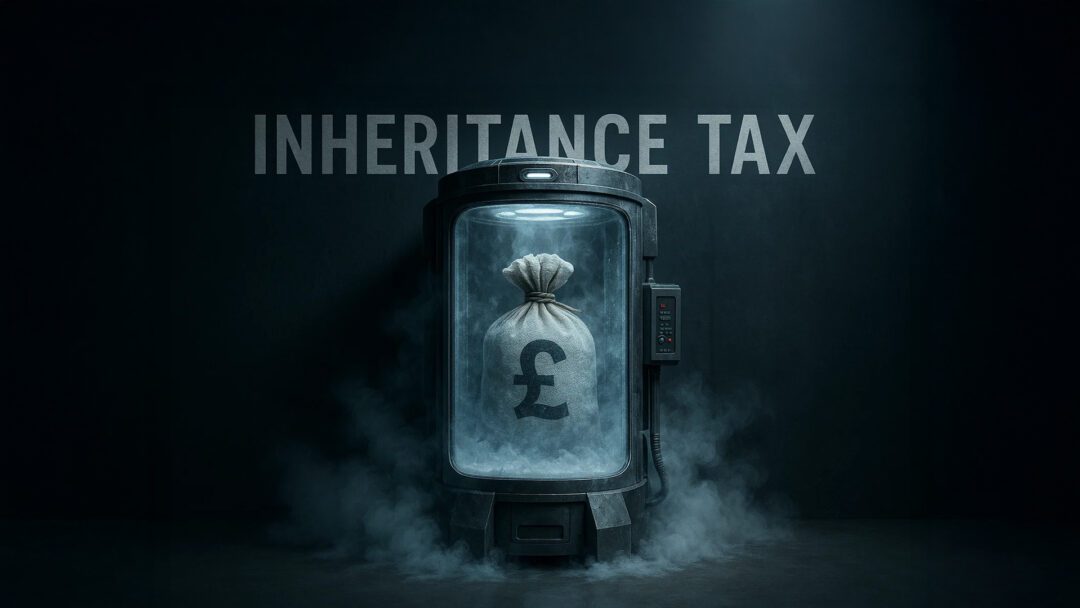
Inheritance Tax threshold freezes
Which tax: Inheritance Tax (IHT)
What is changing: The government has fixed the IHT thresholds at their existing rates for a further one year until 2031. This means that the following thresholds are remaining unchanged until 2031:
- The Nil Rate Band (NRB) of £325,000;
- The Residence NRB of £175,000;
- The Residence NRB taper starting at £2 million; and
- The combined allowance of £1 million for 100% APR and BPR relief.
Other provisions have also remained unchanged including the seven-year rule in connection with lifetime gifting.
Impact: With the impact of inflation increasing the value of estates, this will mean more estates paying IHT, as well as higher IHT bills.
What should you consider: You should consider your estate’s exposure to IHT and whether any assets could be gifted during your lifetime or there are any other potential structures that might be advantageous to reduce your exposure to IHT.
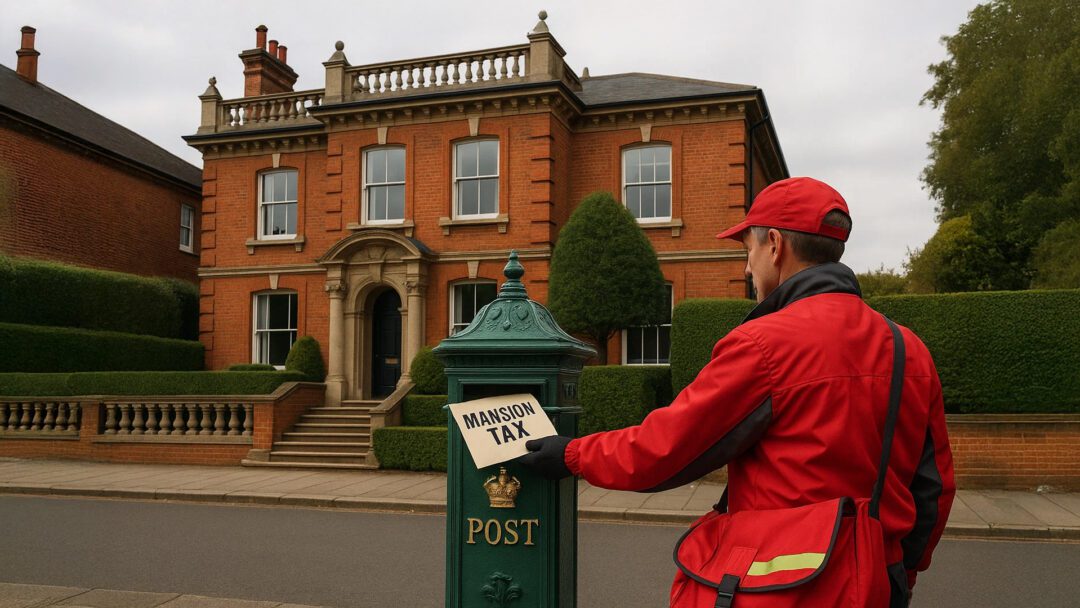
High Value Council Tax Surcharge (aka the ‘Mansion Tax’)
Which tax: High Value Council Tax Surcharge (HVCTS)
What is changing: The government is introducing a new annual charge on residential properties worth more than £2 million. The level of the charge will vary depending on the value of the property:
| Threshold | Rate |
| £2,000,000 – £2,500,000 | £2,500 |
| £2,500,000 – £3,500,000 | £3,500 |
| £3,500,000 – £5,000,000 | £5,000 |
| £5,000,000+ | £7,500 |
This charge will be payable by owners of residential property, rather than occupiers. It will be administered by local authorities, but paid to central government.
The charge will first take effect in April 2028, with valuations carried out by the government’s Valuation Office, and there are due to be revaluations every 10 years. The announcement states that the tax will apply to “owners of residential property in England worth £2 million or more in 2026”, and so it is not clear if therefore it will be based on a retrospective valuation (i.e. what the property would have been worth in 2026, in the same way that Council Tax is based on what a property would have been worth in 1991), or whether more properties will be brought into the scope of the charge as prices rise over time.
There is very little detail as part of this initial announcement, and the government will be holding a consultation in early 2026 on a support scheme for those who need it as well as the reliefs and exemptions that will be available, and how the charge will apply to more complex holding structures such as companies, trusts and partnerships.
Impact: Those who own residential properties worth more than £2 million may be hit by the charge, but the real impact of the policy cannot be assessed until we know what exemptions will be provided. For example, exemptions might be provided for farmhouses.
What should you consider: Once the details of the policy have been established following the consultation next year, those owning residential property will need to review their position and consider whether they need to take any steps to qualify for an exemption.

Electric Vehicle mileage charge
Which tax: Electric Vehicle Excise Duty (eVED)
What is changing: The government has announced a new mileage charge that will be applicable to electric and hybrid cars. This is a new proposal that is currently in consultation and set to take effect from April 2028 and is designed to ensure a system whereby all drivers are contributing based on both the types of cars as well as how much they drive.
Impact and considerations: For those who drive electric or hybrid cards, a mileage charge will be introduced alongside the existing annual Vehicle Excise Duty. The proposed rate to be applicable from April 2028 will be 3 pence per mile in relation to fully electric vehicles and 1.5 pence per mile for hybrid vehicles. This will still be a beneficial rate for those who drive electric or hybrid vehicles as the rates are half the equivalent fuel duty rate that is applicable to both petrol and diesel cards.

NICs on salary-sacrifice pension contributions
Which tax: National Insurance Contributions (NICs)
What is changing: Effective from April 2029, the government is changing how the policies surrounding salary sacrifice for pension contributions works. Under the current policy, employees and employers are able to agree an amount that is taken out of an individual’s salary and put into a pension before the payment is subject to income tax and national insurance.
The new regime from April 2029 will mean that there is a cap of £2,000 on the amount of employee pension contributions through this scheme which will be exempt from national insurance contributions.
Impact: The impact of this change will be two-fold for both employers and employees.
For employers, whilst the arrangements can remain in place, only the first £2,000 will be exempt from national insurance. The cap will therefore result in higher national insurance contribution bills for employers. For employees, any pension contributions above £2,000 will be subject to national insurance contributions.
Further guidance on this will be published in due course.
What should you consider: Employees should consider whether salary sacrifice for pensions will still be appropriate for them. Employees may also consider using the salary sacrifice scheme for other available benefits if this is something their employer offers.
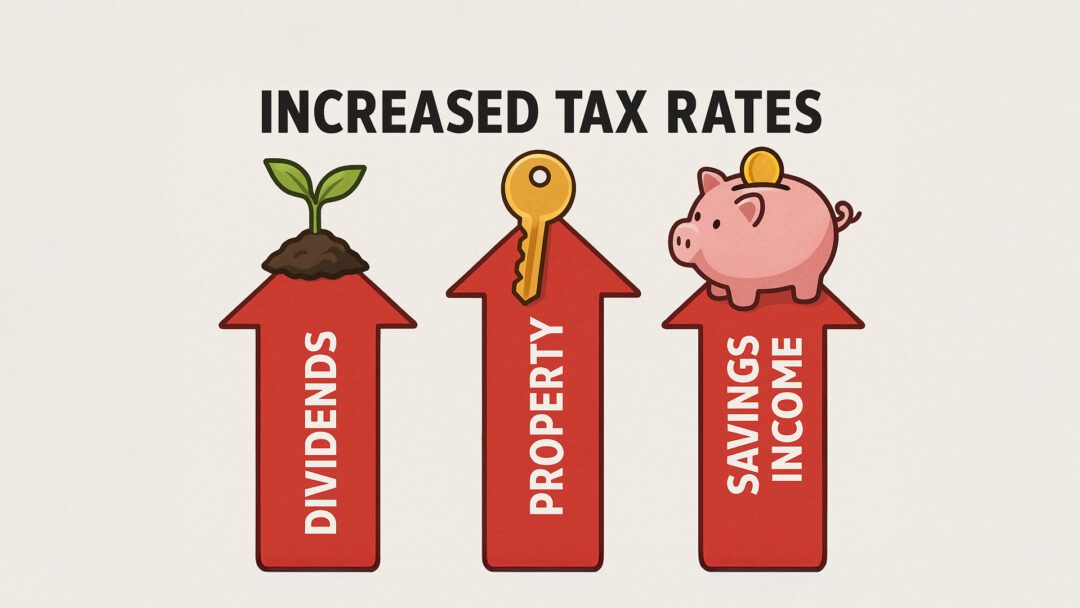
Increased tax rates on dividends, property and savings income
Property Income
Which tax: Income Tax
What is changing: A separate rate of tax is being introduced for property income. Under the current rules, property income is taxed at the same rates as all other types of income. From April 2027, the following rates will apply for property income:
| Level of Income | Income Tax Rate |
| Within personal allowance | 0% |
| Basic rate | 22% |
| Higher rate | 42% |
| Additional rate | 47% |
Impact and considerations: For those that own rental properties, this will be an increase in the tax that is due on their property income. Property owners should be aware of this change and ensure that after April 2027 the income is correctly reported in their tax return and the tax paid.
Savings Income
Which tax: Income tax
What is changing: The rates of tax applicable to savings income is increasing by 2 percentage points. Currently, savings income is taxed in line with income tax rates. However, from April 2027, the rates will be increased to the following for savings income:
| Level of Income | Income Tax Rate |
| Within the personal allowance | 0% |
| Basic rate | 22% |
| Higher rate | 42% |
| Additional rate | 47% |
Impact and considerations: Those who receive income from their savings should be aware of the increase and ensure that after April 2027 the income is correctly reported and the tax paid at the correct rates.
Dividend Income
Which tax: Income Tax
What is changing: The rates of tax applicable to dividend income for individuals is increasing from April 2026. The dividend rates are increasing by two percentage points from basic and higher rate taxpayers. The additional rate for dividends will remain unchanged. The following rates will be effective from April 2026:
| Level of Income | Income Tax Rate |
| Within Dividend Allowance or Personal Allowance | 0% |
| Basic rate | 10.75% |
| Higher rate | 33.75% |
| Additional rate | 39.35% |
Impact: For individuals who are shareholders and receive dividend income regularly, this increase will reduce the income that they receive from the dividends after tax. While dividend rates remain lower than the rate applicable to other income, this is to reflect the fact that company profits distributed as dividends to shareholders will already have been subject to Corporation Tax.
What should you consider: The increased rates reduce the gap between the existing income tax rates and the dividend rates. Companies could consider whether any dividends can be paid to shareholders before April 2026 so that the shareholders can utilise the current lower tax rates. Beyond this, it will be important to consider whether a company is the appropriate structure for a business, or whether other structures not subject to Corporation Tax (for example, an LLP) might be suitable.
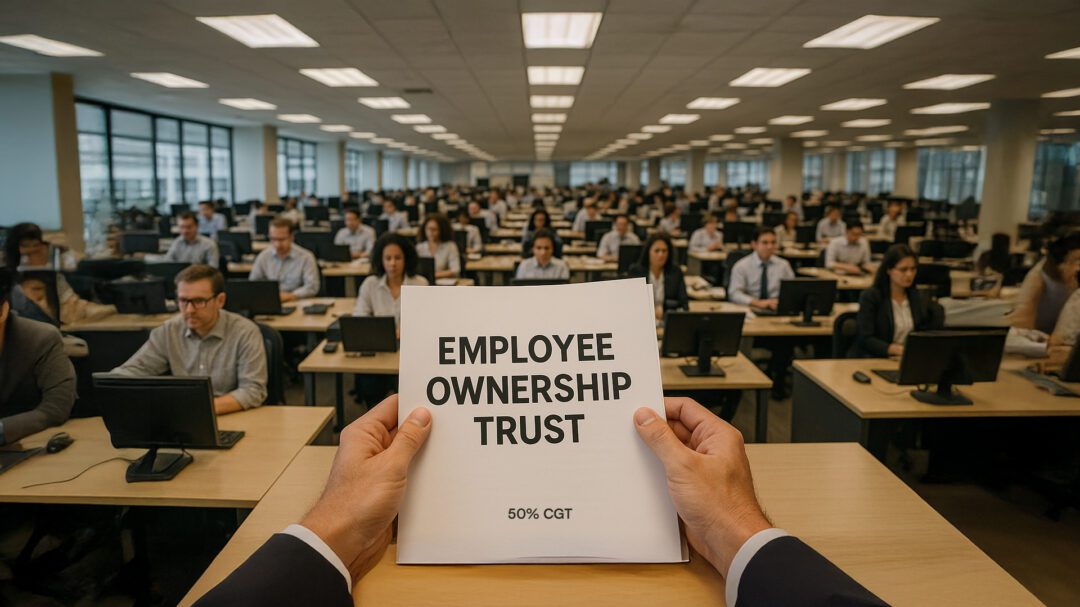
Reduced capital gains tax relief on disposals to EOTs
Which tax: Capital Gains Tax (CGT)
What is changing: Qualifying disposals of shares to trustees of an Employee Ownership Trust (EOT) will now benefit from a CGT holdover relief of 50%. This has been reduced from the 100% holdover relief that was previously available for such disposals. The transferor will pay CGT on 50% of the gain, while the held over gain will be chargeable on any future disposal made by the EOT trustees. This measure applies to all qualifying disposals made on or after 26 November 2025.
Impact: This measure will impact the trustees of EOTs and shareholders considering creating or making a disposal of shares to an EOT, as CGT will likely now be payable.
What should you consider: Those planning to set up an EOT should consider the impact of a CGT charge on the disposal, and consider whether an EOT is still the most appropriate solution.

Transferable allowances for APR and BPR
Which tax: Inheritance Tax (IHT)
What is changing: The government had previously announced that claims for Agricultural Business Relief (APR) and Business Property Relief (BPR) would be restricted to only £1 million at the 100% rate of relief, with any further relief limited to a rate of 50%. It was announced today that this £1 million allowance will now be transferable between spouses and civil partners. This means that if the first person to die does not use up their own allowance (for example, because they leave all their assets to their spouse or civil partner, and so it is exempt), the surviving spouse or civil partner will be able to claim up to £2 million at the 100% rate of relief. Helpfully, the government has confirmed that this will also apply where the first death took place before the rules changed.
Impact: This is a welcome change and one that advisors and industry bodies have been calling for ever since the restrictions to APR and BPR were announced last year. It should simplify estate planning for farm and business owners, since under the reforms as originally announced it would have been necessary to ‘use it or lose it’ by passing qualifying assets on to the next generation or a trust on the first death. Now, it is possible for the surviving spouse or civil partner to inherit everything and handle the succession during their lifetime or upon death.
This will also eliminate one of the elements of unfairness in the reform, which was that where a spouse or civil partner had died before the changes were announced, the survivor would have been limited to £1 million allowance, whereas a couple who both died after they were aware of the changes had the opportunity to structure their planning in order to secure £2 million of allowance.
What should you consider: As welcome as this change may be, it does not change the main substance of the reform, which is due to take effect in relation to deaths from 6 April 2026. The restricted reliefs mean that farms and family businesses are going to be exposed to potentially huge IHT charges on death. It is very important that landowners and business owners take expert advice on how to manage their successions in a tax-efficient manner, taking into account the needs of the family and the business.

Capping IHT trust charges for former Excluded Property Trusts
Which tax: Inheritance Tax (IHT)
What is changing: Previously, a trust set up by a person at a time that they were not UK domiciled was known as an Excluded Property Trust (EPT) because any assets it held located outside the UK would be excluded from IHT charges under the relevant property regime that applies to trusts. This changed from 6 April 2025, and now if the settlor of the trust becomes UK long term resident, the trust will become subject to IHT on its worldwide assets.
The government has announced that the IHT payable by a trust that qualified as an EPT on 30 October 2024 will be capped at £5 million for each 10 year cycle. This would mean that trusts with a taxable value of more than £83 million on the 10th anniversary would have their IHT bill limited to £5 million, although the change would provide no benefit to trusts smaller than this.
Impact: The changes to the taxation of EPTs have been unpopular with formerly non-UK domiciled individuals who had previously relied on the exemption provided to enable them to move to the UK without exposing their entire wealth to IHT. The changes have strongly contributed to such individuals leaving the UK in order to avoid being caught by the charge. It appears that this change could be intended as a way to alleviate this deterrent effect for UHNW individuals, while still raising the same amount of tax from the majority of former EPTs.
What should you consider: Details on this proposed cap are still very thin, but those who have previously settled very high value EPTs and are considering leaving the UK to avoid an IHT charge on those trusts should consider if this will make the tax liability slightly more palatable.

Abolition of the notional tax credit on dividends received by non-UK residents
Which tax: Income Tax
What is changing: Individuals not tax resident in the UK can benefit from the ‘disregarded income’ rules. This means that their UK income tax liability is capped at no more than would be the case if if their ‘disregarded income’ (which includes various categories of income, most notably dividends from UK companies and interest) and personal allowance were left out of the calculation. However, at present it is possible for them to deduct from their tax liability a notional tax credit on their dividends at the ordinary rate of 8.75%, although no tax is actually deducted from those dividends at source.
This tax credit had previously been abolished for UK residents, and the government has now announced that it intends to abolish it for non-residents as well.
Impact: For those non-residents whose only UK-source income takes the form of dividends, this will not change anything, as the dividends remain disregarded income and therefore they will have no income tax liability. However, those who have a mixture of dividends and other, non-disregarded income (for example UK property income or employment income) may find their UK tax bill increased somewhat, as the dividend tax credit is no longer deductible.
What should you consider: It may be possible to reduce income tax liabilities through careful restructuring. However, it is important to be careful that whatever changes you make are not caught out by anti-avoidance rules such as the Transfer of Assets Abroad Rules, which have extremely broad impact. You should therefore take expert advice to fully understand your options.

Incorporation Relief Claims
Which tax: Capital Gains Tax (CGT)
What is changing: Incorporation Relief applies when a business (sole trader or partnership) is transferred to a company in exchange for shares. This transfer would usually attract a CGT charge but where incorporation relief applies the CGT charge is deferred until the company shares are sold.
The government has introduced a requirement for incorporation relief to be claimed in the Self Assessment tax return for the tax year in which the transfer took place. Previously, this relief was applied automatically, if available.
Impact: You must claim this relief if it is applicable to your transfer as the relief will no longer be applied automatically.
What should you consider: Claiming this relief will be an additional consideration when preparing your Self Assessment tax return.

ISA reform
Which tax: Income Tax
What is changing: The government has announced a reform of the ISA savings limits.
Under the current rules, all UK resident individuals or members of the armed forces/crown servants over 18 can save tax-free up to £20,000 in each tax year in four different types of ISA:
- Cash ISA;
- Stocks and Shares ISA;
- Innovative Finance ISA; and
- Lifetime ISA (up to £4,000 and only for those under 40).
From the 6 April 2027, people under the age of 65 can still save £20,000 tax free but the cash ISA limit will be £12,000. The remaining £8,000 can be put into other ISA products such as Stocks and Shares or Innovative Finance ISA.
The rules remain unchanged for individuals over 65 years old.
Impact and considerations: If you wish to put further funds into your cash ISA, you should look to utilise your full £20,000 allowance in this current tax year 2025/26 and the next tax year 2026/27. Beyond this, you will need to consider your savings accounts and potentially look at different ISA accounts to utilise the full allowance of £20,000. You should ensure that going forward you keep track of how much is going into your cash ISA in each tax year and you do not exceed the new limit.

Inheritance Tax on used pension funds and death benefits
Which tax: Inheritance Tax (IHT)
What is changing: The IHT treatment for unused pension funds and death benefits is changing. The measures introduced in the 2024 Budget meant that most unused pension funds and death benefits would be bought within the value of an individual’s estate for IHT purposes from 6 April 2027. This ultimately means that further IHT will be payable on estates which contain pension wealth.
Within this Budget, the provision has been further adapted to mean that the executors or PRs of an estate will be able to direct pension administrators to withhold 50% of any benefits that are taxable for 15 months and pay IHT. Additionally, if clearance has been granted by HMRC and a pension policy is subsequently discovered, the PRs will be discharged from the liability to pay IHT. Legislation is expected to be drafted on this and be effective from April 2027.
Impact: This provision will impact individuals who are administering estates that are subject to IHT as they should be aware that these policies are now within scope of IHT. The provision will also impact beneficiaries as they will likely receive less by way of inheritance.
What should you consider: You should keep an accurate record of all of your pension policies. You should also consider your pensions when looking at your wider estate planning and exposure to IHT. Based on an individual’s circumstances, you could also discuss with your advisor if there is any benefit of drawing down your pension.
Infected blood IHT exemption
Which tax: Inheritance Tax (IHT)
What is changing: Where the infected or affected person eligible for compensation under the Infected Blood Compensation Schemes has died before the payment is made, the first living recipient of that compensation payment will receive an IHT credit to pass on the value of the payment when they die without an IHT charge.
Additionally, where the person eligible for the compensation has already died, the first living recipient can redirect some or all of the compensation via a deed of variation within two years of the payment being made, without any IHT becoming due.
Impact: Beneficiaries of deceased victims can receive compensation payments without an immediate IHT charge. They also have flexibility to redirect payments within two years of the payment being made while preserving the original tax treatment.
What you should consider: Individuals who are due compensation under these schemes should ensure that any deeds of variation are completed within two years of payment to maintain the intended Inheritance Tax treatment. Eligible individuals could also consider how this interacts with wider estate planning and potential tax liabilities.

Capital Gains Tax: non-resident capital gains
Which tax: Capital Gains Tax (CGT).
What is changing: At present, non-resident CGT can apply to non-UK residents disposing of UK property or shares in “property-rich” companies. This change will be focused on Protected Cell Companies (PCCs), which are a type of company made up of a number of separate cells where the assets and liabilities of one cell are segregated and protected from those of the other cells. The government will amend the property-richness test for PCCs so that each individual cell is assessed separately for property-richness rather than looking at the PCC as a whole. This means only the assets of the cell being sold matter for deciding if UK CGT applies, ensuring that CGT exposure is aligned with the assets attributable to the specific cell being disposed of.
In addition, the existing Extra-Statutory Concession for non-UK resident individuals investing in Collective Investment Vehicles, which exempts them from needing to make a double taxation treaty claim via tax return, will be formalised in legislation.
These changes will apply from 6 April 2026.
Impact: Non-resident investors disposing of interests in PCCs may see different outcomes depending on the asset composition of the specific cell involved. Individuals invested in Collective Investment Vehicles will see their current concessionary treatment confirmed in legislation, offering more certainty.
What should you consider: Once the detailed legislation is in place, review whether any investments involve PCC structures and reassess property-richness and CGT exposure on a cell-by-cell basis. Consider the timing of disposals close to the commencement date and whether future reporting or treaty-claim requirements may change for affected individuals.
For those using the existing concession for Collective Investment Vehicles, confirm you continue to qualify once the rules are put on a statutory basis.

Residence-based tax regime: technical amendments
Which tax: Income Tax, Capital Gains Tax (CGT) and Inheritance Tax (IHT).
What is changing: This measure is a collection of corrective amendments to the broader residence-based tax regime established in the Finance Act 2025. The amendments do not alter policy: they simply refine how the rules are written, how eligibility for reliefs is determined and how specific provisions interact across the affected taxes
Impact: The amendments will likely affect those individuals who are eligible for Foreign Income and Gains (FIG) relief, Overseas Workday Relief, and the temporary repatriation facility.
Most individuals will not see a change in intended tax outcomes, but some may notice clearer rules around the treatment of foreign income and gains, the operation of the four-year FIG regime for new arrivals, and the way residence-based criteria feed into IHT exposure.
What should you consider: Individuals should review their residence status, eligibility for the FIG regime, and any transitional planning involving foreign income or gains in light of the clarified rules.

Annual Tax on Enveloped Dwellings – availability of relief
Which tax: Annual Tax on Enveloped Dwellings (ATED).
What is changing: ATED is an annual tax that applies to UK residential properties (“dwellings”) owned by companies, partnerships with corporate members or collective investment vehicles (i.e. “non-natural persons”). Certain reliefs are available where a dwelling is held for a “qualifying commercial purpose”. At present, claims for relief must be made in an ATED return submitted within 12 months of the end of the relevant chargeable period. The government is going to change the law to permit claims for relief to be made outside this period.
Impact: Owners of enveloped dwellings that meet the “qualifying commercial purpose” criteria may now be able to claim relief even if they did not submit the claim at the usual time. This could reduce or eliminate their ATED liability for that period, potentially saving significant annual tax on high-value residential properties held within companies or similar structures. Given many corporate property owners still appear to be unaware of ATED, this will be of great help to them in correcting their tax position.
However, penalties will still be charged for ATED returns that are submitted after the filing deadline, and so it is still important to submit returns in time where this is possible.
What should you consider: Individuals should review properties held in corporate wrappers to see if they qualify for commercial-use relief. If qualifying, those owning enveloped dwellings that meet the “qualifying commercial purpose” should consider submitting a relief claim even if they previously missed the standard filing window.
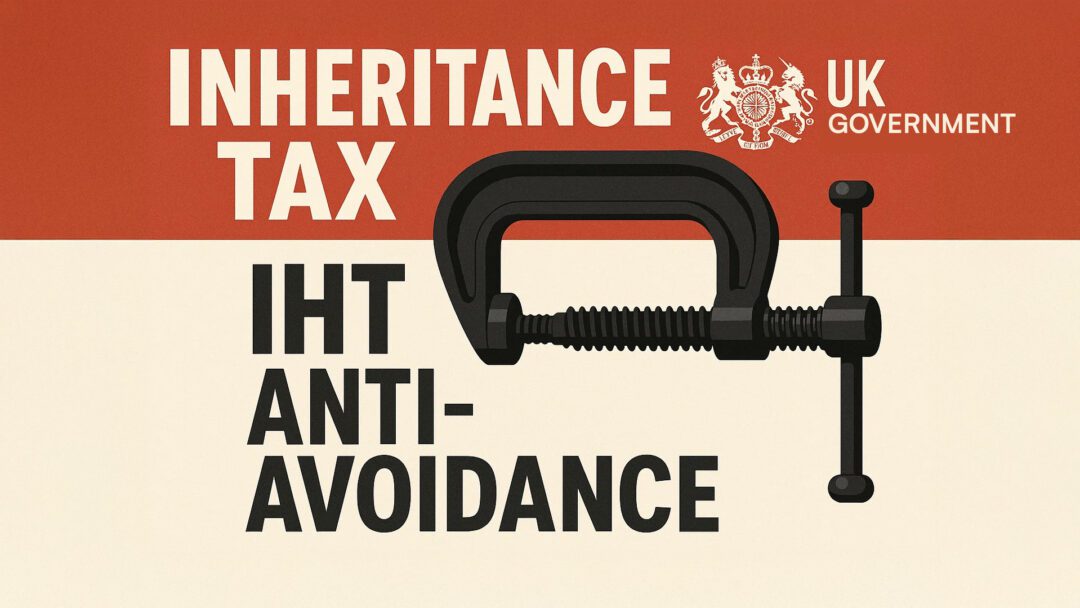
IHT anti-avoidance measures
Which tax: Inheritance Tax (IHT)
What is changing: The government has introduced three new anti-avoidance measures.
The first means that where non-UK companies hold UK agricultural property this will be subject to a “look-through” provision in the same way that this currently applies to UK residential property. This will therefore bring them within the scope of IHT even where held by non-Long Term Resident (LTR) individuals. This will apply from 6 April 2026.
The second change is to close a loophole in the IHT rules applying to trusts in the relevant property regime. An exit charge is payable where assets cease to be relevant property as a result of the settlor ceasing to be LTR. Previously trustees could avoid this by making trust property UK situs before the change in the settlor’s status, and then changing it back afterwards. The change prevents this by disapplying the exit charge exemption. This is applicable from 26 November 2025.
Finally the IHT exemption on gifts to charity will be restricted to gifts made directly to UK charities or qualifying community sports clubs, as opposed to gifts to trusts for charitable purposes. This will apply to lifetime gifts from 26 November 2025 and gifts made on death from 6 April 2026.
Impact: The first change will increase the IHT exposure of non-LTR individuals holding UK agricultural property via an offshore company, as it will no longer be possible to ‘situs-block’ this. The third change may be problematic for gifts to trust made during lifetime or in Will to a discretionary trust where the trustees have discretion to select a UK charity or charities to benefit, as these may no longer qualify for charitable exemption.
What should you consider: Depending on the composition of your asset base and residence history, an alternative structure may be more appropriate to avoid increased IHT charges. It is important that expert tax advice is sought to help manage any potential restructuring. Where you have gifts to trusts for charitable purposes in your Will, these should be reviewed to see whether a different approach will be more beneficial.
To discuss any queiry or question that you may have, please fill out the enquiry form below.
Read More